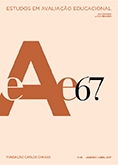Governança educacional global e a gênese dos testes das habilidades socioemocionais
DOI:
https://doi.org/10.18222/eae.v28i67.4006Palavras-chave:
Políticas Educacionais, Avaliação da Educação, Habilidades Socioemocionais, Governança Educacional Global.Resumo
O discurso de que as economias estão cada vez mais inter-relacionadas tem justificado o papel de destaque que a Organização para a Cooperação e Desenvolvimento Econômico (OCDE) tem desempenhado em relação à educação e, especialmente no que tange à investigação que originou este texto, o enaltecimento que a Organização tem dado às habilidades socioemocionais. Propomo-nos a investigar em que medida seria possível identificar na atuação da OCDE mecanismos que comprovem a existência de um projeto de governança educacional global. A aplicação do instrumental analítico proposto por Charaudeau (2014) aos documentos que compuseram nosso corpus permitiu-nos afirmar que a OCDE tem posto em prática um verdadeiro projeto de governança educacional global, constituindo os três mecanismos de governança apontados por Jakobi e Martens (2010): a produção de ideias, a avaliação de políticas e a geração de dados; assim como os modos de governança cognitivo e normativo, concebidos por Woodward (2009).
Downloads
Referências
BAKER, D.; LE TENDRE, G. Global similarities and national differences. Stanford, CA: Stanford University, 2005.
BALL, S. Sociologia das políticas educacionais e pesquisa crítico-social: uma revisão pessoal das políticas educacionais e da pesquisa em política educacional. In: BALL, S.; MAINARDES, J. (Org.). Políticas educacionais: questões e dilemas. São Paulo: Cortez, 2011.
CARVALHO, L. Governando a educação pelo espelho do perito: uma análise do Pisa como instrumento de regulação. Educação e Sociedade, Campinas, SP, v. 30, n. 109, p. 1009-1036, set./dez. 2009.
CHARAUDEAU, P. Linguagem e discurso: modos de organização. São Paulo: Contexto, 2014.
DIAS SOBRINHO, J. A avaliação ética e política em função da educação como direito público ou como mercadoria?. Educação e Sociedade, Campinas, SP, v. 25, n. 88, p. 703-725, out. 2004.
ECCLESTON, R. The OECD and Global Economic Governance. Australian Journal of International Affairs, London, v. 65, n. 2, p. 243-255, Apr. 2011.
FARKAS, G. Cognitive skills and noncognitive traits and behaviors in stratification processes. Annual Review of Sociology, Palo Alto, CA, v. 29, p. 541-562, Aug. 2003.
GERWITZ, S.; BALL, S. Do modelo de gestão do ‘Bem-Estar Social’ ao ‘novo gerencialismo’: mudanças discursivas sobre gestão escolar no mercado educacional. In: BALL, S.; MAINARDES, J. (Org.). Políticas educacionais: questões e dilemas. São Paulo: Cortez, 2011.
GRUBB, W. N.; LAZERSON, M. The globalization of rhetoric and practice: the education gospel and vocationalism. In: LAUDER, H.; BROWN, P.; DILLABOUGH, J. A.; HALSEY, A. H. (Org.). Education, globalization and social change. Oxford: Oxford University, 2006. p. 295-307.
HECKMAN, J. J.; STIXRUD, J.; URZUA, S. The effects of cognitive and noncognitive abilities on labor market outcomes and social behavior. Journal of Labor Economics, Chicago, v. 24, n. 3, p. 411-482, July 2006.
JAKOBI, A.; MARTENS, K. Introduction: the OECD as an actor in international politics. In: MARTENS; K.; JAKOBI, A. (Ed.). Mechanisms of OECD Governance: international incentives for national policy-making?. Oxford: Oxford University, 2010.
KAMENS, D. Globalization and the emergence of an audit culture: Pisa and the search for ‘best practices’ and magic bullets. In: MEYER, H-D.; BENAVOT, A. (Org.). Pisa, power and policy: the emergence of global education governance. Oxford: Symposium Books, 2013.
LEVIN, H. More than just test scores. Prospects: Quarterly Review of Comparative Education, Palo Alto, CA, v. 42, n. 3, p. 269-284, Sept. 2012.
MEYER, H-D.; BENAVOT, A. Pisa and the globalization of education governance: some puzzles and problems. In: MEYER, H-D.; BENAVOT, A. (Org.). Pisa, power and policy: the emergence of global education governance. Oxford: Symposium Books, 2013.
ORGANIZAÇÃO PARA A COOPERAÇÃO E DESENVOLVIMENTO ECONÔMICO. Education at a Glance 2013: OECD indicators. Paris: OECD, 2013a.
ORGANIZAÇÃO PARA A COOPERAÇÃO E DESENVOLVIMENTO ECONÔMICO. Pisa 2015: draft collaborative problem solving framework. Paris: OECD, 2013b.
PARO, V. Parem de preparar para o trabalho! Reflexões acerca dos efeitos do neoliberalismo sobre a gestão e o papel da escola básica. In: FERRETTI, C. et al. (Org.). Trabalho, formação e currículo: para onde vai a escola?. São Paulo: Xamã, 1999.
RAVITCH, D. National opportunity to learn summit. 2011. Disponível em: <http://www.ucc.org/justice/public-education/pdfs/NatlOTL.pdf>. Acesso em: 15 nov. 2014.
SELLAR, S.; LINGARD, B. Pisa and the expanding role of the OECD in global educational governance. In: MEYER, H-D.; BENAVOT, A. (Org.). Pisa, power and policy: the emergence of global education governance. Oxford: Symposium Books, 2013.
SHIROMA, E.; GARCIA, R.; CAMPOS, R. Conversão das ‘almas’ pela liturgia da palavra: uma análise do discurso do movimento Todos pela Educação. In: BALL, S.; MAINARDES, J. (Org.). Políticas educacionais: questões e dilemas. São Paulo: Cortez, 2011.
WOODWARD, R. The Organization for Economic Cooperation and Development (OECD). Abingdon, MA: Routledge, 2009.
Downloads
Publicado
Como Citar
Edição
Seção
Licença
Copyright (c) 2017 Estudos em Avaliação Educacional

Este trabalho está licenciado sob uma licença Creative Commons Attribution-NonCommercial 4.0 International License.
Autores que publicam nesta revista concordam com os seguintes termos:
a. Autores mantém os direitos autorais e concedem à revista o direito de primeira publicação, com o trabalho simultaneamente licenciado sob a Licença Creative Commons Attribution (CC BY 4.0) que permite o compartilhamento do trabalho com reconhecimento da autoria e publicação inicial nesta revista.
b. Autores têm autorização para assumir contratos adicionais separadamente, para distribuição não-exclusiva da versão do trabalho publicada nesta revista (ex.: publicar em repositório institucional ou como capítulo de livro), com reconhecimento de autoria e publicação inicial nesta revista.
c. Autores têm permissão e são estimulados a publicar e distribuir seu trabalho online (ex.: em repositórios institucionais ou na sua página pessoal) a qualquer ponto antes ou durante o processo editorial, já que isso pode gerar alterações produtivas, bem como aumentar o impacto e a citação do trabalho publicado (Veja O Efeito do Acesso Livre).








